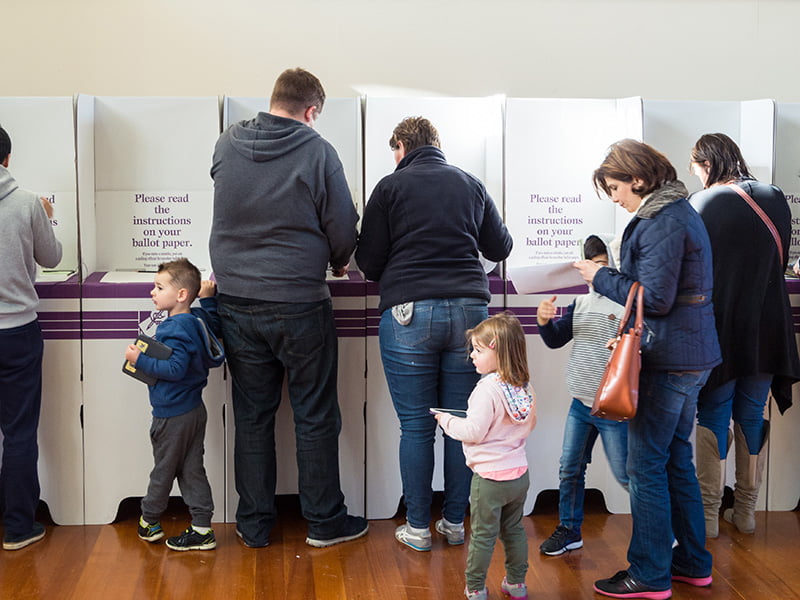A parliamentary inquiry has rebuffed calls for laws banning AI-generated images and videos in election campaigns despite acknowledging the technology will almost certainly be used to spread disinformation.
Crossbench senators have slammed the decision, which they say exposes Australia to deceptive AI content in the upcoming federal election, threatening to undermine trust in democracy.
AI-generated deepfakes have already been witnessed during election campaigns oversees this year, including in South Korea, where the government fast-tracked laws to criminalise their use of political campaign videos.

In an interim report focused on the impacts of AI on democracy, the Select Committee on Adopting AI recommended the government develop and implement voluntary codes ahead of the next federal election.
It said the codes would relate to watermarking and credentialing of AI-generated electoral content, with responsibility likely to fall on political candidates, parties and digital platforms.
But with the election due before mid-May, the Labor-led Senate committee has stopped short of recommended new legislation, arguing that there is not enough time to “properly designed scheme to be thoroughly consulted on and enacted”.
“… Any such legislative scheme must be carefully considered to avoid potential bias in its application, and to ensure that it does not impinge on the right to freedom of expression and the implied right to freedom of political communication,” it said.
The government is reportedly already seeking advice on a South Korean-style ban, as it wades through submissions to its second round of consultations on responsible AI, which will inform the final design of mandatory guardrails.
Under existing legislation, the use of AI to mispresent policy or political figures in political advertising is not unlawful under the Commonwealth Electoral Act as long as it is authorised by a political party.
In addition to voluntary codes, the committee has recommended that the government undertake a “thorough review of potential regulatory responses to AI-generated political or electoral deepfake content” before May.
The review would consider mandatory codes for developers of AI models and social media platform, and bans on the production and dissemination of political deepfake content in the lead up to elections.
Any codes would be expected to “complement rather than conflict” with the ten mandatory guardrails for AI in high-risk settings already proposed by the government, as well as the misinformation and the truth in political advertising reforms.
Voluntary undertakings by industry will also provide “some mitigation of the risks of AI to election processes” in the interim, although the committee acknowledge that these are not yet “sufficiently comprehensive and robust”.
Coalition senators welcomed the review but reserved their final position on the voluntary codes until after a review of the United States’ policy response for the election is completed.
The senators also “strongly opposed laws that purport to adjudicate truth in political advertising”, adopting a similar position to the federal government’s misinformation reforms.
Greens Senator David Shoebridge described the recommendations as “disappointing” and that the “absence of specific laws regulating the use of AI during elections presents a significant risk”.
“Without targeted measures in place, AI-manipulated content will be used to mislead voters or damage candidates’ reputations, undermining the integrity of the democratic process,” he said.
The Greens had proposed a “temporary and targeted ban on political deepfakes during the next election”, with exemptions for “parody, satire, faire criticism, news reporting and legal proceedings… to ensure that free speech and media reporting are preserved”.
“While it would be a challenge to get laws in place in such a short timeline the risk posed justifies this haste,” Senator Shoebridge said, while adding that by not acting, the government created “real risks for the integrity of the next election”.
Senator Pocock, who has been pushing for a ban and last month created AI-generated videos of the prime minister and opposition leader to prove his point, said the government should “not delay action to protect our democracy”.
“Suggestions that we need to go slowly in the face of rapidly changing use of AI seems ill-advised — there should be a swift move to put laws in place ahead of the next Federal election that rule out the use of generative AI,” he said.
“We should be looking at mandatory, not voluntary codes, given the potential for AI generated content (being spread by algorithms that are kept secret) to influence elections and undermine trust in our democracy.”
Senator Pocock has also recommended that government amend the Privacy Act to require that political parties disclose where personal data is being collected and how it will be used.
Do you know more? Contact James Riley via Email.

